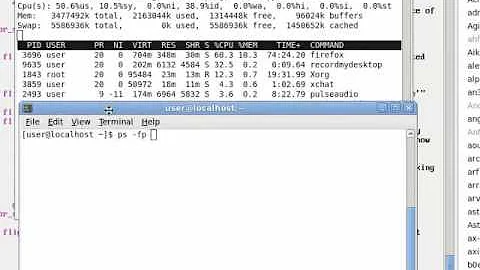How to get pgrep to display full process info
Solution 1
pgrep's output options are pretty limited. You will almost certainly need to send it back through ps to get the important information out. You could automate this by using a bash function in your ~/.bashrc.
function ppgrep() { pgrep "$@" | xargs --no-run-if-empty ps fp; }
Then call the command with.
ppgrep <pattern>
Solution 2
Combine pgrep with ps using xargs!
pgrep <your pgrep-criteria> | xargs ps <your ps options> -p
For example try
pgrep -u user | xargs ps -f -p
to get a full process list of user. Option -u user limits pgrep to the user given (as a number or name) while the ps options -f -p request a full format listing for the selected PID.
It's nice that you keep the first line with the column names. grep always drops the column names.
Solution 3
The following only gives you PID + full command-line. For "all the info ps does", see other answers...
Most linuxes use procps-ng. Since 3.3.4 (released in 2012), pgrep -a (--list-full) shows the full command line.
Note: By default pgrep only matches the pattern you give against the executable name.
If you want to match against the full command line (as grepping ps does), add the -f (--full) option.
In older versions (including the original procps project), -l option showed info but it's behavior varied:
-
pgrep -flmatched the pattern against full command line and showed the full command line. -
pgrep -lalone matched only executable name and showed only executable name.
If you don't want full match, you couldn't see the full command line :-( [https://bugs.debian.org/cgi-bin/bugreport.cgi?bug=526355#15]
Not sure what code *BSD use but their man page documents the old -fl behavior.
Unfortunately you can't even use -fl portably - in recent procps-ng, -f (--list-name) always prints only the executable name.
Solution 4
Linux grep
For the GNU version of pgrep long + fuzzy output is achieved with -af and the string must be case-sensitive (i.e. there is no option for case-insensitivity).
$ pgrep -af apache
OUTPUT:
1748 /usr/sbin/apache2 -k start
-a, --list-full
List the full command line as well as the process ID. (pgrep only.)
-f, --full
The pattern is normally only matched against the process name.
When -f is set, the full command line is used.
MacOS/BSD grep
On MacOS/BSD -l (long output) in combination with -f (match against full argument lists) will display the complete command (-i adds case-insensitivity):
$ pgrep -fil ssh
OUTPUT:
33770 ssh: [email protected] [mux] t
-l Long output. For pgrep, print the
process name in addition to the
process ID for each matching
process. If used in conjunction
with -f, print the process ID and
the full argument list for each
matching process. For pkill, dis-
play the kill command used for
each process killed.
❗️NOTE: GNU
grepcan be installed on MacOS withbrew install pgrep— this will expose the GNU flavour under/usr/local/bin/pgrepand depending on your $PATH config might break code which relies on the BSD syntax ofpgrep.
Solution 5
Use the -v option to grep - it returns everything BUT the requested pattern.
ps -ef | grep <process> | grep -v grep
Related videos on Youtube
JoelFan
Updated on September 17, 2022Comments
-
JoelFan over 1 year
Is there any way to get
pgrepto give me all the info about each process thatpsdoes? I know I can pipepsthroughgrepbut that's a lot of typing and it also gives me thegrepprocess itself which I don't want. -
JoelFan over 13 yearsThanks! I modified it to:
function ppgrep() { pgrep "$@" | xargs ps fp 2> /dev/null; }Otherwise, if no processes match your search, it dumps a wholepsusage megilla. -
prusswan almost 10 yearsexcellent! this resolves a strange problem with arcgis server startup script for xfvb
-
Dave M almost 9 yearsCan you please elaborate. More info would improve this answer
-
Erik Nomitch over 8 yearsOn OS X, the
psneeds a hyphen for the flags:function ppgrep() { pgrep "$@" | xargs ps -fp 2> /dev/null; } -
 Doug about 8 yearsIf you want to avoid the ps usage page, GNU xargs has an option,
Doug about 8 yearsIf you want to avoid the ps usage page, GNU xargs has an option,-rthat will only execute the command if it has received a list. -
 BringBackCommodore64 over 7 yearsThis was the best answer for me. It shows you the full command without being truncated as it happens with
BringBackCommodore64 over 7 yearsThis was the best answer for me. It shows you the full command without being truncated as it happens withpgrep -u user | xargs ps -f -p -
Scott Prive almost 7 yearsThis should be the accepted answer, because it uses unix pipes in a proper way, taking a list of PIDs from one tool and feeding back into another (if it seems like hackery, it's not - this technique can be used in LOTS of UNIX tools, like email grep tools. The Bash function ppgrep() is an unnecessary dependency, and avoids confronting the learning opportunity presented here.)
-
Igor Mikushkin about 5 yearsMore concise way is
ps fp $(pgrep -d, "$@")




